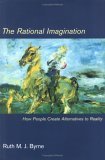‘The Rational Imagination’ by Ruth M.J. Byrne
Written on August 23, 2007

The Rational Imagination: How People Create Alternatives to Reality by Ruth M.J. Byrne – discusses research on cognitive processes involved in counterfactual (“if only…”) and semifactual (“even if…”) thinking.
excerpt from the summary, p. 214:
This book has sketched seven principles derived from the study of reasoning that explain imaginative thoughts. People think about possibilities, … true possibilities. They do not tend to think about false possibilities. They also tend to think about just a few of the true possibilities. People can think about dual possibilities… When they think about counterfactual possibilities, they can think about a possibility that is false, and they may even suppose it to be true. They keep track of whether the possibilities they think about are real or imagined. Dual possibilities are more mutable than single possibilities; people can more readily create a counterfactual alternative to a possibility when they have mentally represented it from the outset with a second possibility. People understand obligations by thinking about the forbidden possibility as well as the permitted possibility. They can imagine how a situation should have been different by mentally changing a forbidden possibility to be more like the permitted possibility. The possibilities people envisage encode temporal information about the order of events in the world. The seven principles are not intended as an exhaustive set; nonetheless this fragment provides the beginnings of an explanation of the counterfactual imagination, The principles help to explain some of the remarkable regularities in the counterfactual alternatives that people create. For example, they explain why people create counterfactual alternatives to actions, to controllable events, to forbidden events, and to recent events. They explain why counterfactual thoughts focus on enabling causal relations and semifactual thoughts focus on weak causal relations.
My claim is that the counterfactual imagination is rational. … the set of principles that guide the possibilities people think about when they reason also guide their imaginative thoughts.
more information at Google Book Search
Filed in: mind.


